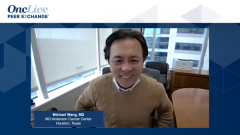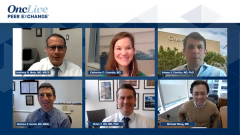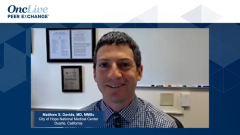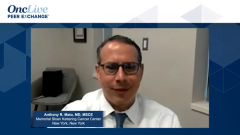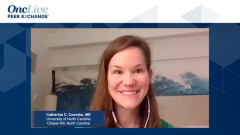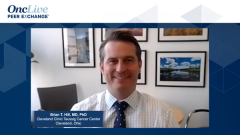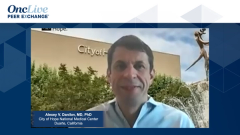
Pirtobrutinib and Other Non-Covalent BTK Inhibitors in the Treatment of CLL
The assembled faculty comment on data on the role of non-covalent BTK inhibitors in the CLL treatment landscape, with emphasis on the phase 1/2 BRUIN trial of pirtobrutinib.
Episodes in this series

Anthony R. Mato, MD, MSCE: Next, we’re going to delve into the noncovalent [agents], and a lot has already been presented on pirtobrutinib in the context of the BRUIN trial. These results were presented again at the EHA [European Hematology Association 2022 Congress]. I gave the presentation highlighting the response rate of 68% in 252 patients who were previously treated with a covalent BTK [Bruton tyrosine kinase] inhibitor. The responses were durable. The median PFS [progression-free survival] was not reached there in the double-exposed patients. It was 18 months. I think probably most importantly, Michael already highlighted the AE [adverse event] profile was spectacular: just a 1% discontinuation rate due to AEs in over 600 patients with CLL [chronic lymphocytic leukemia] and lymphomas. I think we all agree [that] the data look extremely promising for this agent. The few times Michael and I have presented this, people always ask me, “Well, how do you move this up to an earlier line of therapy?”
I wanted to switch gears to you to talk about the trials that are in progress, specifically looking at pirtobrutinib versus [other agents]. I’ll ask you to comment first on the…relapsed/refractory trial versus idelalisib and rituximab or bendamustine and rituximab, the relevance of the trial and your thoughts. Then I’ll also ask you to comment on the time-limited approach with venetoclax and rituximab plus or minus pirtobrutinib in the relapsed/refractory setting. How will these studies change management or advance [the] standard of care?
Matthew S. Davids, MD, MMSc: There are a number of registrational studies now underway with pirtobrutinib, and some of them are not the most exciting comparators, but I think they’re important to understand how this drug compares to our existing standards. In the relapsed setting, comparing to idelalisib plus rituximab and bendamustine plus rituximab, it’s going to make for a comparable data set from what we have with [the] ASCEND [trial] and acalabrutinib. I think that will be useful.
We are also participating in a different registrational study of pirtobrutinib with venetoclax and rituximab vs venetoclax and rituximab alone. I think that’s an exciting comparator to see if the pirtobrutinib adds something to the MURANO [trial] regimen, which is already very powerful. As pirtobrutinib moves into the frontline setting, there are also going to be head-to-head studies of ibrutinib vs pirtobrutinib. There’s going to be pirtobrutinib vs venetoclax and rituximab in the frontline setting. There’s going to be a wealth of phase 3 data coming along, but it is going to take time to approve these patients and get them treated and followed. I think it’s going to be interesting to see. Michael may have a better sense of when pirtobrutinib may get an accelerated approval in mantle cell lymphoma [MCL]. I think, once that happens, there will be the potential for off-label use in CLL, particularly in the double-refractory population. I think it will get some use there in CLL.
Anthony R. Mato, MD, MSCE: Michael, any comment on when we might see this in MCL?
Michael Wang, MD: We’re submitting the abstract to ASH [American Society of Hematology]. I think if it’s quick, it may be next year. I hope this happens.
Anthony R. Mato, MD, MSCE: Got it. Alexey, pirtobrutinib is being studied in the frontline [setting]. My understanding is [that] it’ll be compared to bendamustine and rituximab, or it will be compared to ibrutinib head-to-head. Any comment on those trials?
Alexey V. Danilov, MD, PhD: I haven’t seen any data [from] these trials yet, obviously. I think it would be important to see how it ultimately compares to ibrutinib and acalabrutinib. I have not had much personal experience with pirtobrutinib, but I certainly hear great things. There is a very low discontinuation rate for adverse events for the drug. I think one question would be the pattern of resistance, whether there would be any cross-resistance with covalent BTK inhibitors emerging post-pirtobrutinib. That would be certainly something we’ll have to think about in terms of its use in the frontline setting. Certainly, I’m very excited to see any early data from these trials.
Anthony R. Mato, MD, MSCE: Matt, there’s not only 1 noncovalent [agent] in development, but there’s a second agent and maybe a third or fourth that I don’t even know about yet. Certainly nemtabrutinib has been presented by Jennifer Woyach, [MD]. Can you comment on those data? And then of course, without doing a direct comparison to pirtobrutinib, where [do] you think this molecule might be headed in CLL or lymphomas? Michael, I’ll throw the same question to you.
Matthew S. Davids, MD, MMSc: Nemtabrutinib is also a noncovalent BTK inhibitor; in terms of the kinase inhibitory profile, it’s a little broader than pirtobrutinib. Pirtobrutinib is more specific. But they’ve presented some promising data from about 118 patients across lymphomas with nemtabrutinib. Of those, 68 have CLL, and although the median follow-up is short, responses have been observed in close to 60% of patients. These are generally heavily pretreated patients, most of them had progressed on a prior covalent BTK inhibitor. Many of them had TP53-abberant disease. From an efficacy perspective, it also looks promising. There have been more toxicities observed comparing across studies to pirtobrutinib, whether it’s fatigue, constipation, even some dysgeusia and infections. I think we’ll have to see how that plays out over time, but it it’s always good to have options for patients. It’s nice to see these data coming along for nemtabrutinib.
Anthony R. Mato, MD, MSCE: Michael?
Michael Wang, MD: Yes, there’s a phase 3 randomized trial in MCL of pirtobrutinib vs a covalent BTK inhibitor of any choice, so I have the feeling that the efficacy probably will be the same. I would love to see better data than that, but I’ve had the feeling that the efficacy will be the same [and] that the toxicity will be dramatically different.
Transcript has been edited for clarity.


